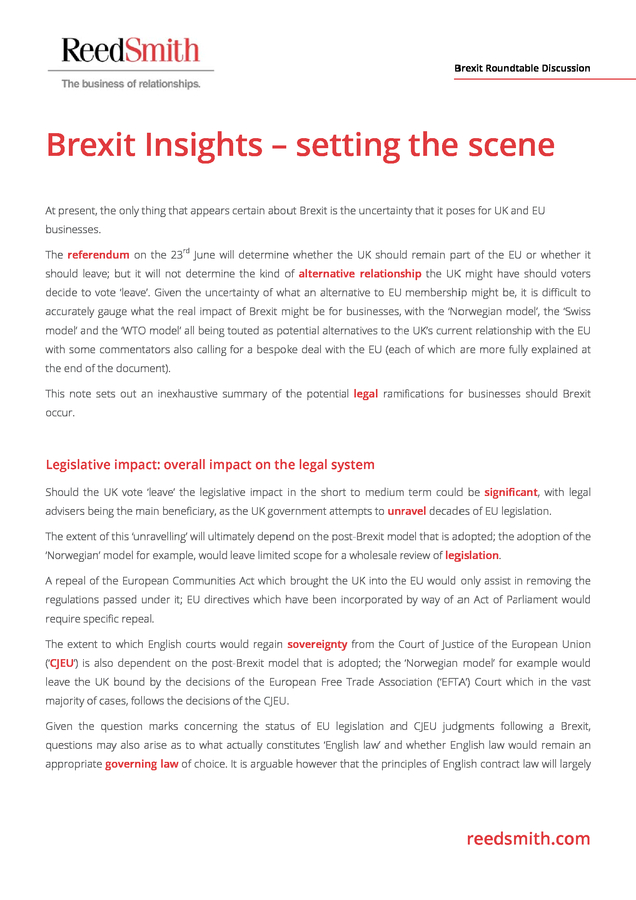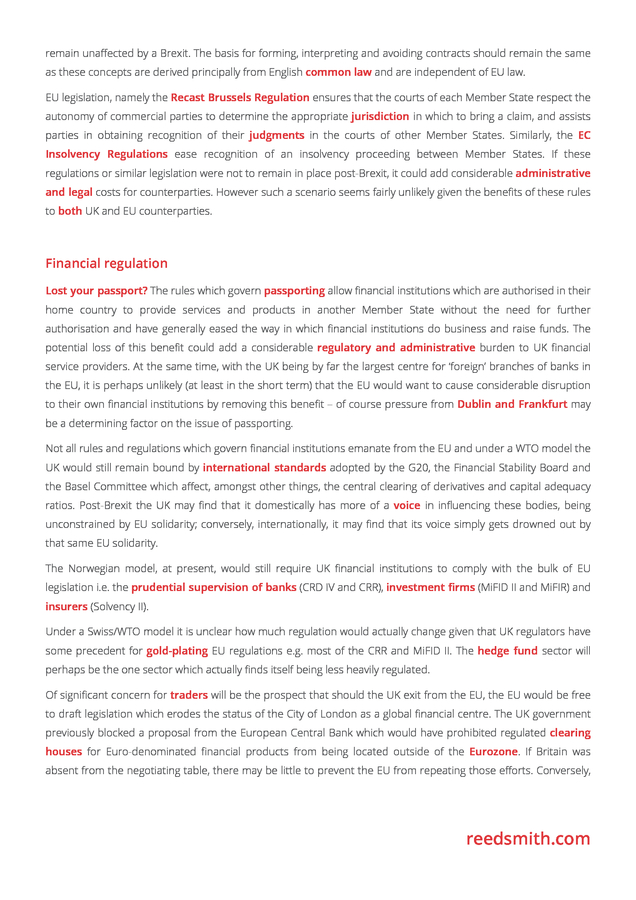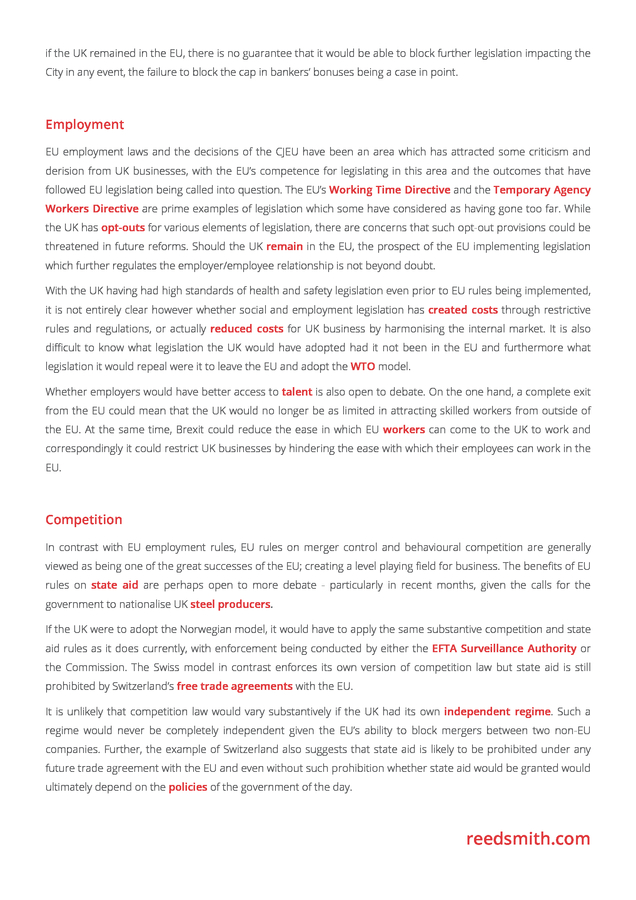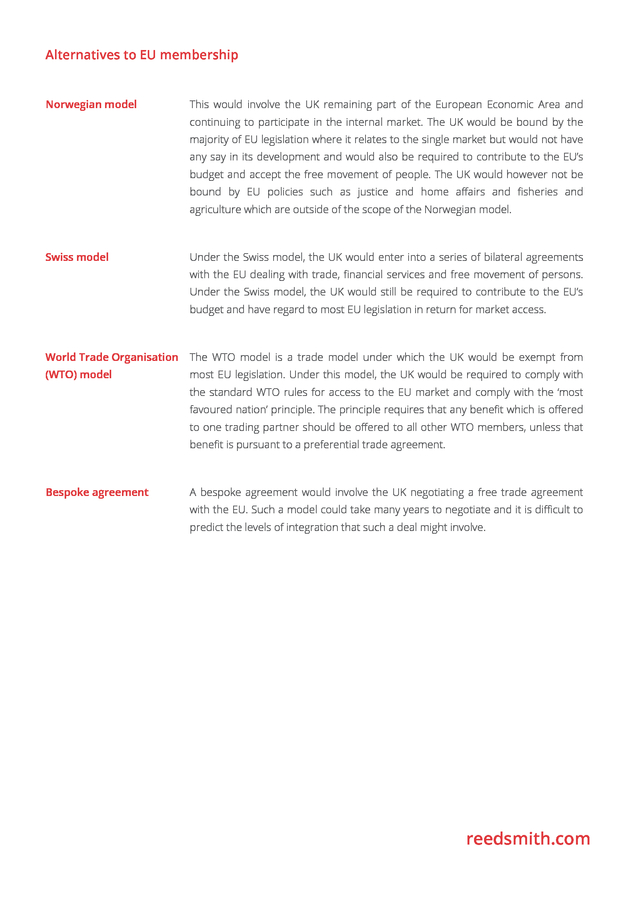Brexit Insights - Setting the Scene - the uncertainty that it poses for UK and EU businesses – May 4, 2016
Reed Smith
Description
B
Brexit Roundt
table Discuss
sion
Brexit Insigh – sett
B
hts
ting the scene
At present, the only thing that appears certain abou Brexit is the uncertain that it pos for UK and EU
e
ut
nty
ses
businesses.
um
23
e
he
art
U
er
The referendu on the 2 rd June will determine whether th UK should remain pa of the EU or whethe it
ot
of
ve
ship the UK might have should vot
K
e
ters
should leave; but it will no determine the kind o alternativ relations
e
en
rtainty of wh an altern
hat
native to EU membershiip might be, it is difficult to
t
decide to vote ‘leave’. Give the uncer
curately gauge what the real impact of Brexit m
e
t
might be for businesses, with the ‘No
orwegian mo
odel’, the ‘Sw
wiss
acc
mo
odel’ and the ‘WTO mode all being touted as po
e
el’
t
otential alternatives to th UK’s curre relationship with the EU
he
ent
wit some com
th
mmentators also calling for a bespo ke deal with the EU (eac of which are more fully explained at
ch
d
the end of the document).
e
This note sets out an inexhaustive su
s
ummary of t
the potentia legal ramifications for businesses should Bre
al
r
s
exit
occur.
Le
egislative impact: ov
verall imp
pact on th e legal system
Should the UK vote ‘leave the legislat
K
e’
tive impact in the short to medium term could be signific
t
m
d
cant, with le
egal
eneficiary, as the UK gove
ernment atte
empts to unr
ravel decade of EU legislation.
es
advisers being the main be
this ‘unravelling’ will ultim
mately depen on the pos
nd
st-Brexit model that is ad
dopted; the adoption of the
The extent of t
orwegian’ mo
odel for exam
mple, would leave limited scope for a wholesale review of leg
d
r
gislation.
‘No
A repeal of the European Communitie Act which brought the UK into the EU would only assist in removing the
r
e
es
e
e
reg
gulations passed under it; EU direct
tives which h
have been in
ncorporated by way of a Act of Pa
an
arliament wo
ould
req
quire specific repeal.
c
The extent to which Englis courts wo
sh
ould regain sovereignty from the Court of Just
y
C
tice of the European Un
nion
JEU’) is also dependent on the post
t-Brexit mod that is ad
del
dopted; the ‘Norwegian model’ for example wo
ould
(‘CJ
lea the UK b
ave
bound by th decisions of the Euro
he
opean Free Trade Assoc
ciation (‘EFTA Court wh
A’)
hich in the v
vast
ma
ajority of cases, follows th decisions of the CJEU .
he
Giv
ven the que
estion mark concernin the statu of EU leg
ks
ng
us
gislation and CJEU judg
gments follo
owing a Bre
exit,
questions may also arise a to what actually cons
y
as
a
stitutes ‘English law’ and whether En
nglish law wo
ould remain an
overning law of choice. It is arguable however th the princ
w
hat
ciples of Eng
glish contract law will larg
t
gely
appropriate go
e
reedsm
mith.com
. remain unaffected by a Brexit. The basis for forming, interpreting and avoiding contracts should remain the same
as these concepts are derived principally from English common law and are independent of EU law.
EU legislation, namely the Recast Brussels Regulation ensures that the courts of each Member State respect the
autonomy of commercial parties to determine the appropriate jurisdiction in which to bring a claim, and assists
parties in obtaining recognition of their judgments in the courts of other Member States. Similarly, the EC
Insolvency Regulations ease recognition of an insolvency proceeding between Member States. If these
regulations or similar legislation were not to remain in place post-Brexit, it could add considerable administrative
and legal costs for counterparties.
However such a scenario seems fairly unlikely given the benefits of these rules to both UK and EU counterparties. Financial regulation Lost your passport? The rules which govern passporting allow financial institutions which are authorised in their home country to provide services and products in another Member State without the need for further authorisation and have generally eased the way in which financial institutions do business and raise funds. The potential loss of this benefit could add a considerable regulatory and administrative burden to UK financial service providers. At the same time, with the UK being by far the largest centre for ‘foreign’ branches of banks in the EU, it is perhaps unlikely (at least in the short term) that the EU would want to cause considerable disruption to their own financial institutions by removing this benefit – of course pressure from Dublin and Frankfurt may be a determining factor on the issue of passporting. Not all rules and regulations which govern financial institutions emanate from the EU and under a WTO model the UK would still remain bound by international standards adopted by the G20, the Financial Stability Board and the Basel Committee which affect, amongst other things, the central clearing of derivatives and capital adequacy ratios.
Post-Brexit the UK may find that it domestically has more of a voice in influencing these bodies, being unconstrained by EU solidarity; conversely, internationally, it may find that its voice simply gets drowned out by that same EU solidarity. The Norwegian model, at present, would still require UK financial institutions to comply with the bulk of EU legislation i.e. the prudential supervision of banks (CRD IV and CRR), investment firms (MiFID II and MiFIR) and insurers (Solvency II). Under a Swiss/WTO model it is unclear how much regulation would actually change given that UK regulators have some precedent for gold-plating EU regulations e.g. most of the CRR and MiFID II.
The hedge fund sector will perhaps be the one sector which actually finds itself being less heavily regulated. Of significant concern for traders will be the prospect that should the UK exit from the EU, the EU would be free to draft legislation which erodes the status of the City of London as a global financial centre. The UK government previously blocked a proposal from the European Central Bank which would have prohibited regulated clearing houses for Euro-denominated financial products from being located outside of the Eurozone. If Britain was absent from the negotiating table, there may be little to prevent the EU from repeating those efforts.
Conversely, reedsmith.com . if the UK remained in the EU, there is no guarantee that it would be able to block further legislation impacting the City in any event, the failure to block the cap in bankers’ bonuses being a case in point. Employment EU employment laws and the decisions of the CJEU have been an area which has attracted some criticism and derision from UK businesses, with the EU’s competence for legislating in this area and the outcomes that have followed EU legislation being called into question. The EU’s Working Time Directive and the Temporary Agency Workers Directive are prime examples of legislation which some have considered as having gone too far. While the UK has opt-outs for various elements of legislation, there are concerns that such opt-out provisions could be threatened in future reforms. Should the UK remain in the EU, the prospect of the EU implementing legislation which further regulates the employer/employee relationship is not beyond doubt. With the UK having had high standards of health and safety legislation even prior to EU rules being implemented, it is not entirely clear however whether social and employment legislation has created costs through restrictive rules and regulations, or actually reduced costs for UK business by harmonising the internal market.
It is also difficult to know what legislation the UK would have adopted had it not been in the EU and furthermore what legislation it would repeal were it to leave the EU and adopt the WTO model. Whether employers would have better access to talent is also open to debate. On the one hand, a complete exit from the EU could mean that the UK would no longer be as limited in attracting skilled workers from outside of the EU. At the same time, Brexit could reduce the ease in which EU workers can come to the UK to work and correspondingly it could restrict UK businesses by hindering the ease with which their employees can work in the EU. Competition In contrast with EU employment rules, EU rules on merger control and behavioural competition are generally viewed as being one of the great successes of the EU; creating a level playing field for business.
The benefits of EU rules on state aid are perhaps open to more debate - particularly in recent months, given the calls for the government to nationalise UK steel producers. If the UK were to adopt the Norwegian model, it would have to apply the same substantive competition and state aid rules as it does currently, with enforcement being conducted by either the EFTA Surveillance Authority or the Commission. The Swiss model in contrast enforces its own version of competition law but state aid is still prohibited by Switzerland’s free trade agreements with the EU. It is unlikely that competition law would vary substantively if the UK had its own independent regime. Such a regime would never be completely independent given the EU’s ability to block mergers between two non-EU companies.
Further, the example of Switzerland also suggests that state aid is likely to be prohibited under any future trade agreement with the EU and even without such prohibition whether state aid would be granted would ultimately depend on the policies of the government of the day. reedsmith.com . Alternatives to EU membership Norwegian model This would involve the UK remaining part of the European Economic Area and continuing to participate in the internal market. The UK would be bound by the majority of EU legislation where it relates to the single market but would not have any say in its development and would also be required to contribute to the EU’s budget and accept the free movement of people. The UK would however not be bound by EU policies such as justice and home affairs and fisheries and agriculture which are outside of the scope of the Norwegian model. Swiss model Under the Swiss model, the UK would enter into a series of bilateral agreements with the EU dealing with trade, financial services and free movement of persons. Under the Swiss model, the UK would still be required to contribute to the EU’s budget and have regard to most EU legislation in return for market access. World Trade Organisation The WTO model is a trade model under which the UK would be exempt from (WTO) model most EU legislation. Under this model, the UK would be required to comply with the standard WTO rules for access to the EU market and comply with the ‘most favoured nation’ principle.
The principle requires that any benefit which is offered to one trading partner should be offered to all other WTO members, unless that benefit is pursuant to a preferential trade agreement. Bespoke agreement A bespoke agreement would involve the UK negotiating a free trade agreement with the EU. Such a model could take many years to negotiate and it is difficult to predict the levels of integration that such a deal might involve. reedsmith.com .
However such a scenario seems fairly unlikely given the benefits of these rules to both UK and EU counterparties. Financial regulation Lost your passport? The rules which govern passporting allow financial institutions which are authorised in their home country to provide services and products in another Member State without the need for further authorisation and have generally eased the way in which financial institutions do business and raise funds. The potential loss of this benefit could add a considerable regulatory and administrative burden to UK financial service providers. At the same time, with the UK being by far the largest centre for ‘foreign’ branches of banks in the EU, it is perhaps unlikely (at least in the short term) that the EU would want to cause considerable disruption to their own financial institutions by removing this benefit – of course pressure from Dublin and Frankfurt may be a determining factor on the issue of passporting. Not all rules and regulations which govern financial institutions emanate from the EU and under a WTO model the UK would still remain bound by international standards adopted by the G20, the Financial Stability Board and the Basel Committee which affect, amongst other things, the central clearing of derivatives and capital adequacy ratios.
Post-Brexit the UK may find that it domestically has more of a voice in influencing these bodies, being unconstrained by EU solidarity; conversely, internationally, it may find that its voice simply gets drowned out by that same EU solidarity. The Norwegian model, at present, would still require UK financial institutions to comply with the bulk of EU legislation i.e. the prudential supervision of banks (CRD IV and CRR), investment firms (MiFID II and MiFIR) and insurers (Solvency II). Under a Swiss/WTO model it is unclear how much regulation would actually change given that UK regulators have some precedent for gold-plating EU regulations e.g. most of the CRR and MiFID II.
The hedge fund sector will perhaps be the one sector which actually finds itself being less heavily regulated. Of significant concern for traders will be the prospect that should the UK exit from the EU, the EU would be free to draft legislation which erodes the status of the City of London as a global financial centre. The UK government previously blocked a proposal from the European Central Bank which would have prohibited regulated clearing houses for Euro-denominated financial products from being located outside of the Eurozone. If Britain was absent from the negotiating table, there may be little to prevent the EU from repeating those efforts.
Conversely, reedsmith.com . if the UK remained in the EU, there is no guarantee that it would be able to block further legislation impacting the City in any event, the failure to block the cap in bankers’ bonuses being a case in point. Employment EU employment laws and the decisions of the CJEU have been an area which has attracted some criticism and derision from UK businesses, with the EU’s competence for legislating in this area and the outcomes that have followed EU legislation being called into question. The EU’s Working Time Directive and the Temporary Agency Workers Directive are prime examples of legislation which some have considered as having gone too far. While the UK has opt-outs for various elements of legislation, there are concerns that such opt-out provisions could be threatened in future reforms. Should the UK remain in the EU, the prospect of the EU implementing legislation which further regulates the employer/employee relationship is not beyond doubt. With the UK having had high standards of health and safety legislation even prior to EU rules being implemented, it is not entirely clear however whether social and employment legislation has created costs through restrictive rules and regulations, or actually reduced costs for UK business by harmonising the internal market.
It is also difficult to know what legislation the UK would have adopted had it not been in the EU and furthermore what legislation it would repeal were it to leave the EU and adopt the WTO model. Whether employers would have better access to talent is also open to debate. On the one hand, a complete exit from the EU could mean that the UK would no longer be as limited in attracting skilled workers from outside of the EU. At the same time, Brexit could reduce the ease in which EU workers can come to the UK to work and correspondingly it could restrict UK businesses by hindering the ease with which their employees can work in the EU. Competition In contrast with EU employment rules, EU rules on merger control and behavioural competition are generally viewed as being one of the great successes of the EU; creating a level playing field for business.
The benefits of EU rules on state aid are perhaps open to more debate - particularly in recent months, given the calls for the government to nationalise UK steel producers. If the UK were to adopt the Norwegian model, it would have to apply the same substantive competition and state aid rules as it does currently, with enforcement being conducted by either the EFTA Surveillance Authority or the Commission. The Swiss model in contrast enforces its own version of competition law but state aid is still prohibited by Switzerland’s free trade agreements with the EU. It is unlikely that competition law would vary substantively if the UK had its own independent regime. Such a regime would never be completely independent given the EU’s ability to block mergers between two non-EU companies.
Further, the example of Switzerland also suggests that state aid is likely to be prohibited under any future trade agreement with the EU and even without such prohibition whether state aid would be granted would ultimately depend on the policies of the government of the day. reedsmith.com . Alternatives to EU membership Norwegian model This would involve the UK remaining part of the European Economic Area and continuing to participate in the internal market. The UK would be bound by the majority of EU legislation where it relates to the single market but would not have any say in its development and would also be required to contribute to the EU’s budget and accept the free movement of people. The UK would however not be bound by EU policies such as justice and home affairs and fisheries and agriculture which are outside of the scope of the Norwegian model. Swiss model Under the Swiss model, the UK would enter into a series of bilateral agreements with the EU dealing with trade, financial services and free movement of persons. Under the Swiss model, the UK would still be required to contribute to the EU’s budget and have regard to most EU legislation in return for market access. World Trade Organisation The WTO model is a trade model under which the UK would be exempt from (WTO) model most EU legislation. Under this model, the UK would be required to comply with the standard WTO rules for access to the EU market and comply with the ‘most favoured nation’ principle.
The principle requires that any benefit which is offered to one trading partner should be offered to all other WTO members, unless that benefit is pursuant to a preferential trade agreement. Bespoke agreement A bespoke agreement would involve the UK negotiating a free trade agreement with the EU. Such a model could take many years to negotiate and it is difficult to predict the levels of integration that such a deal might involve. reedsmith.com .

















